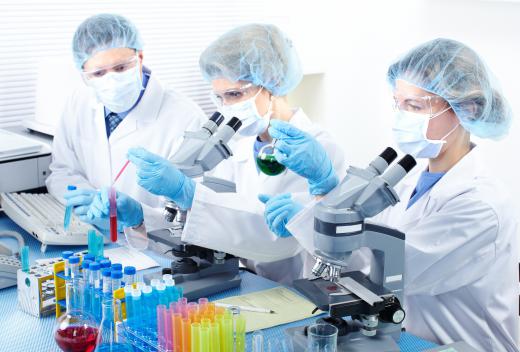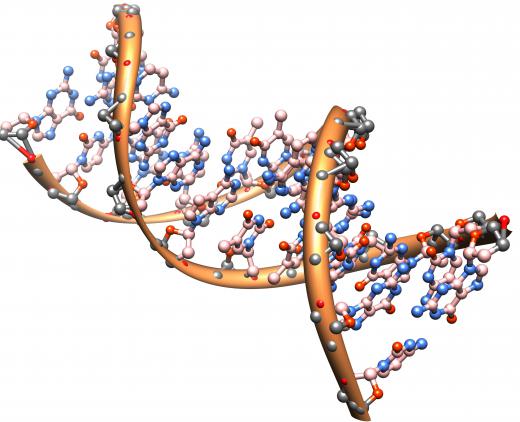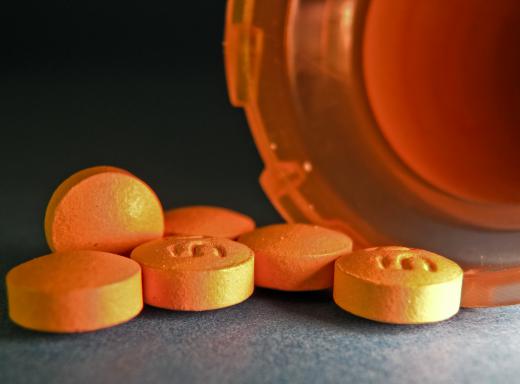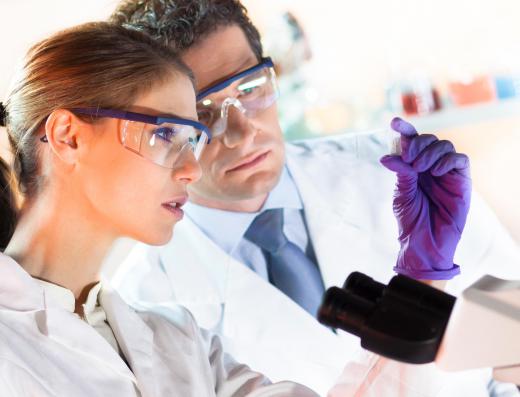What is Medical Biochemistry?
Medical biochemistry is the formal study of biochemical exchanges that occur within the human body in the context of medicine, usually in terms of drug interactions or cellular responses to disease or stimulation. Millions of complex chemical reactions are going on in the human body at any given time. The balance of the endocrine system, which controls hormone levels, is one example; how the brain processes information from nerves and how signals are relayed from place to place is another. By studying and understanding these highly complex reactions, medical biochemists have found ways to better fight infection and disease on the molecular level. Much of the field is dedicated to research. The time experts spend studying samples and creating reactions has led to a number of breakthroughs in heath care and disease management, and it seems likely that this field will be very much “in demand” for years to come.
Basic Overview

Biochemistry itself is a combined study of biology and chemistry, and tends to focus on both how chemical processes happen in organisms and why. Within the medical field, the central concern is almost always health and wholeness. Researchers spend a lot of time studying things like how the body reacts to medicine, which can help them create more effective drugs; they also look for ways of understanding how people react to different environmental triggers like stress as a way of providing more pointed and accurate care. Biochemical research has lead to the discovery of many vaccines, antidepressants, and numerous therapeutic drugs that work hand-in-hand with a person’s chemical makeup on a cellular level.

Some doctors and physicians are trained in this field and aspects of it are taught in most medical schools, though devoted expertise is more common for pharmaceutical researchers and disease control specialists. The advances made in labs and research centers impact the way modern medicine is practiced, though, and in many cases shapes the sort of care that people receive.
DNA Modeling

One of the most significant breakthroughs in the field was the creation of an accurate model of deoxyribonucleic acid (DNA) by James Watson and Francis Crick in 1953. DNA is often referred to as the core “building block” of life, and it contains what’s basically a map to a person’s genetic patterning and makeup. Watson and Crick’s model opened up possibilities that had been inaccessible up until that point. Seeing the inner workings of DNA made it possible to understand human anatomy on a molecular scale, which eventually lead to many changes and advancements in how physicians approach and care for various ailments.

The human genome, which is the complete gene sequence unique to human life, was mapped completely in 2003 as a result of the 13 year Human Genome Project. Since then, medical biochemists have had access to vital genetic information that has allowed for manipulation within the cell nucleus itself. Medical chemists are finding ways to isolate harmful traits within human DNA and have found methods of sometimes causing them to completely shut down prior to manifestation. What this means in practical terms is that doctors can sometimes prevent a disease from happening at all, which can save a lot of suffering and pain.
Other Healthcare Advances
Progress in the related fields of molecular biology, endocrinology, and cellular biology has been rapid in recent years. Since all of these scientific fields tie in closely with medical biochemistry, keeping up with the latest advancements in the field can be difficult. A lot of research and reading goes into this job just in terms of staying current with new discoveries and advancements. There is a lot to learn, and there are a lot of people dedicated to studying different nuanced causes. As much as experts do know about the human body and how it functions, there’s a lot that simply remains a mystery. The more time medical biochemistry experts spend studying it, the closer the field will get to providing answers.
Breaking Into the Field
Getting started as a medical biochemist usually requires a lot of education. A university degree is almost always required, and graduate work in biochemistry, molecular biology, or other health sciences is typically recommended. There are many different sorts of jobs in this field, from working as a lab technician or writing grants to conducting test groups and running drug trials. People with this sort of expertise can work in settings as diverse as pharmaceutical companies, hospitals, or universities. There is a lot of demand for this sort of knowledge and individuals with the right training are often very competitive in the marketplace.
AS FEATURED ON:
AS FEATURED ON:














Discuss this Article
Post your comments